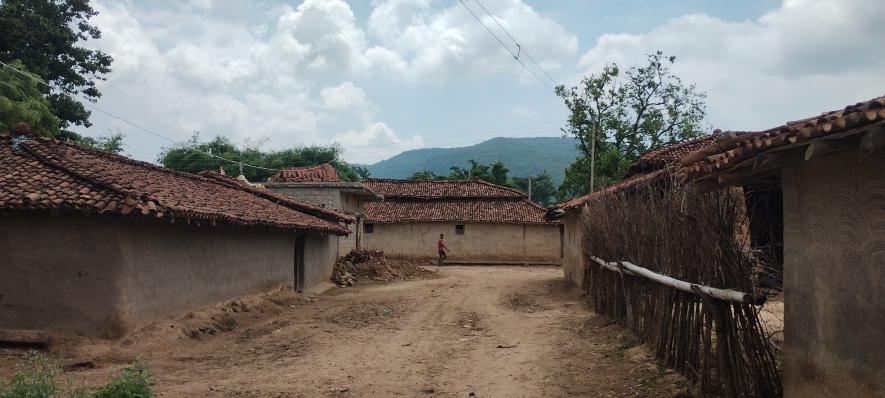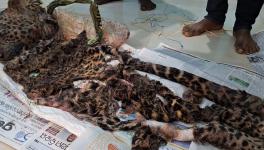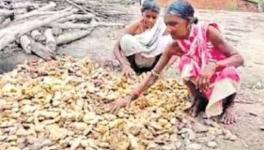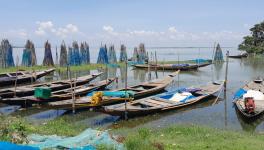‘The Children Are Going to Work...’

A tribal village in Odisha where only women live. Young people are forced to do slave labour and small children are forced to do child labour. (Image Credit: Shubham Kumar)
“Bachche Kam Par Ja Rahe Hain…”
The title is a line from a poem, the meaning of which can be understood later in this article.
This writer has been engaged in research in Koraput, a corner of Odisha, for the past three months.
When one moves from Koraput toward Malkangiri, there’s a scary thrill, a feeling that the chest of the mountains has been ripped apart like a drain, and a thick coat of tar has been applied to it. On both sides of the road surrounded by mountain forests, groups of monkeys and, in a smaller number, transgenders can be seen standing -- awaiting restlessly, for food and some monetary help, respectively.
After walking 50 kilometers, there’s a block named Baipariguda. There is a crossroad; one road goes toward Malkangiri and the other toward Bastar/Sukma. The crossing is surrounded by mountains on all sides. An old man can be seen makes tea near the crossing. Being close to Bastar (Left Wing Extremism or LWE area), paramilitary jawans come here and for drinking tea. Usually, the jawans are in plain clothes.
A few days ago, the grandson of the old tea vendor (who studies in 7th grade) told this writer that his father used to live in the jungle. After further probing, one came to know that the old tea vendor was once a Naxalite, who later surrendered. Since then, the sight of a jawan drinking tea at that place reminded one of poet Devi Prasad Mishra: “Jo bedkhal ki tamtmae akal hai use aap kahte ho ki Naxal” hai (You call the infuriated mind of the dispossessed a Naxal.)
This writer has been living in two villages for the past one month, as part of a project to get children who have dropped out of school re-admitted and to investigate the reasons why these children are leaving school. In technical terms, we are working on dropout children.
Socialist leader Ram Manohar Lohia had said that what is visible is the country. But the country that is visible in these Odisha tribal villages is living in a strange tragedy.
Headed to a village called Silimal on a two-wheeler, this writer was told by several people that many children of this village had stopped going to school. As an open truck passes, in which about 40 to 50 people are standing or sitting, many children, too, could be seen sitting squatting. It was evident that those on the truck were going to work as labourers.
Silimal is a tribal village. At first look, it comes across as a prosperous village. When asked about children not going to school, the village head said he would take this writer to a tribal settlement.
As we approached the settlement, the smell of rotten liquor emanated from some distance. A woman, about 25 years old, wearing three or more nose rings, and without a blouse, was grinding something. Her 3-year-old son was playing next to her. Whenever the son cried, the woman would make the child drink some watery substance kept in a bowl.
The sarpanch (village head) whispered in broken Hindi, “She is feeding liquor to her child.” The woman got up, but before that, drank the remaining liquor in the bowl.
When asked why her two children did not go to school, the woman replied in Odiya, which one could understand from her gestures as, “We don't need education, we need bread.”
The sarpanch helps translate what she said into Hindi. She said, “I have a 15-year-old daughter who works in the fields and takes care of the children. This time the contractor has taken my 14-year-old son out for Rs.1,800/month.”
When asked where her minor son had gone to earn money, the woman said she did not know.
The sarpanch added, “To tell you the truth, the boys from here go to Andhra Pradesh and Kerala. Coconut is cultivated in abundance there; small children can easily climb coconut trees due to their low weight and can also load and board coconuts very easily. Apart from this, many companies in Visakhapatnam and Hyderabad make these children work for their companies, such as biscuit packing, picking empty water or liquor bottles, and working in cashew factories.”
This remined one of a smuggling case in Kalahandi in July 1985. A woman there had given away her 14-year-old child for just Rs 40. The then Prime Minister Rajiv Gandhi visited Kalahandi. But at the same time, the then Chief Minister of Odisha, J. B. Patnaik, gave a shocking statement in an interview. He said there was an “old tradition of selling children” in some tribal areas of western Odisha.
The question is whether this tradition has ended. Or has its character changed?
The smell of alcohol was present everywhere in that village. No man or boy was visible anywhere. A strange kind of dead silence pervaded the village. Pani-bhaat (rice water) and hand-made alcohol are the main foods here.
Later, a teacher said only one child from this village had attended school till date, and there are many such villages in the tribal areas of Odisha where children are never able to go to school. He smiled and added that perhaps “government food” (mid-day meal) was not able to satisfy their hunger.
I drove my two-wheeler out that tribal town and reach the road, where life was running at the same pace as every day, with vehicles plying back and forth, unaware of the nearby tribal village. A slogan written on the wall of a school -- Sab Padhenge, Sab Badhenge– catches attention. This, when there are many villages in the country where no one is studying.
This article ends with same line from the poem with which it started:
“On the fog-covered road, (Kohare se dhaki sadak par)
children are going to work. (bachhe kam par ja rhe hain)
Early in the morning, children are going to work. (subah subah bachhe kam par ja rhe hain)
This is the most terrifying line of our times. (hamare samay ki sabse bhyanak pankti hain yah)
It is terrifying to write it like a description. (bhayanak hai ese vivran ki tarah likha jana)
It should be written as a question. (likha jana chahiye ese sawal ki tarah)….
The writer studied in Banaras Hindu University, Uttar Pradesh, and is currently working as a fellow in Odisha.
Get the latest reports & analysis with people's perspective on Protests, movements & deep analytical videos, discussions of the current affairs in your Telegram app. Subscribe to NewsClick's Telegram channel & get Real-Time updates on stories, as they get published on our website.
























